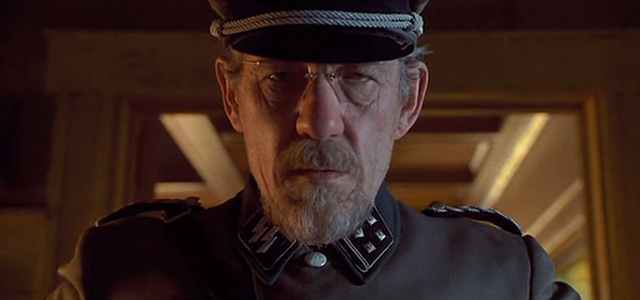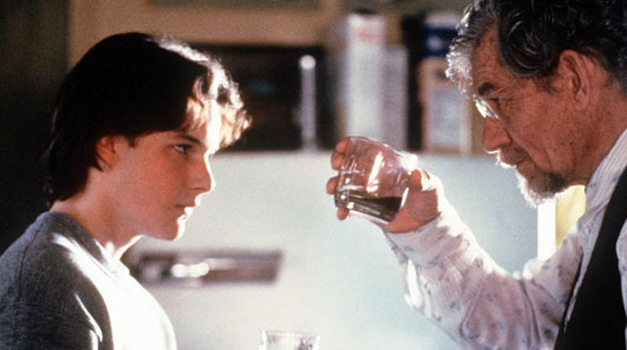Apt Pupil (1998)
CAST: Brad Renfro, Ian McKellen, Bruce Davison, David Schwimmer, Joshua Jackson, Ann Dowd, Elias Koteas, Michael Byrne, Joe Morton, Jan Triska
REVIEW:
WARNING: THIS REVIEW WILL REVEAL “SPOILERS”
Apt Pupil is a morbidly engrossing psychological thriller crafted with enough professionalism and ability to sometimes persuade us to overlook its questionable taste, even if the bad aftertaste lingers. An adaptation of a novella by Stephen King (a previous attempt at filming it was mounted in 1988, starring Ricky Schroder and Nicol Williamson, but fell through), it uses that ever-convenient go-to-guy of villains—Nazis—as a launching pad for a psychological character study. Those seeking a conventional “thriller” might be disappointed. Apt Pupil is disturbing, sometimes chilling, but the horror is not of the “boo!” variety. Apt Pupil is a slow-burn foray into the heart of darkness that resides within two seemingly very different men, and how they feed each other’s worst impulses.
In a 1984 suburban American neighborhood, high school honors student Todd Bowden (Brad Renfro) is nursing a growing morbid obsession with the Holocaust. After his history class and trips to the local library only wet his appetite, he finds a way to go straight to the source: meticulously compiling evidence that Arthur Denker (Ian McKellen), a reclusive, elderly German immigrant living in his neighborhood, is actually Kurt Dussander, a former concentration camp commandant and Nazi fugitive who has lived in anonymity for forty years. When Todd approaches Denker/Dussander, he subjects him to an unusual form of blackmail. All he wants, as he explains to a bewildered Dussander, is to hear about it firsthand, “everything they’re afraid to tell us in school”. Dussander is unenthusiastic about this, but he’s cornered, so he reluctantly gives in. As Todd listens with an unhealthy, disturbing fixation to Dussander’s horror stories of his past atrocities, he begins slipping further into an inner darkness. Meanwhile, Dussander finds dark impulses which have lain dormant for forty years rising to the surface. The seemingly two very different individuals form a twisted bond with shades of mentor and pupil as each awakens the other’s worst impulses. But complications arise when the distracted Todd’s grades start slipping, which could lead to his parents (Bruce Davison, Ann Dowd) and guidance counselor (David Schwimmer) getting a little too nosy about what’s going on, and Todd learns that Dussander may not be as easily controlled as he thinks.
Ostensibly, Apt Pupil is a study in the nature of evil. The phrase “the banality of evil” comes to mind. The movie generates the creeping sense that evil can lurk anywhere, including in a handsome all-American honor student, or a frail old man who you might sit next to on the bus every day. Bryan Singer directs with a sense of eerie dread lurking behind every frame. The scenes in Todd’s high school and idyllic all-American neighborhood are imbued with a gold-tinted hue usually associated with romanticized “glory days”, inverted here with the disturbing undertone of unseen evil. Despite being fixated with Holocaust horror stories, doodling swastikas in class, and even forcing Dussander to dress up in a Nazi uniform ordered from a costume shop, one gets the impression Todd is not specifically fascinated with Nazism, per se, so much as the morbid allure of the horror it wrought, which enraptures his macabre imagination. If you’re looking for a human embodiment of evil, where better to look than a Nazi, reliably used by Hollywood for the past sixty years as a universal representation of villainy? The central relationship between the callow youth and the wily old man is darkly interesting. It has aspects of mentor and pupil, with Todd being the titular “apt pupil” (especially when he climatically blackmails and manipulates someone in the final scene using the exact same words Dussander had used against him earlier), a twisted pseudo-friendship (the initially infuriated Dussander eventually admits he enjoys the company, despite the deep distrust between them), and a power struggle. Initially, Todd seems to have Dussander under his thumb, with the old man meekly submitting. But while Todd is naturally smart, he’s still young and naive, with Dussander far older, more experienced, and more cunning, and the plot thickens when the crafty old man whips the rug out from under the boy and blackmails him in turn. At the same time, Dussander’s physical fragility makes him vulnerable. Their shifting dynamic is enough to keep us interested, which is important, given it’s the central focus. For a while, not much else happens besides Todd and Dussander’s disturbing conversations. A series of plot twists and complications crop up in the last third or so, including a homeless drunk (Elias Koteas) who sees too much, the pesky guidance counselor, a Holocaust survivor (Michael Byrne), and a Nazi hunter (Jan Triska), but for most of its runtime, Apt Pupil is slow-burn.
Apt Pupil has its share of effectively disturbing moments, but also others where it is disturbing for the wrong reasons. Singer goes overboard into excessive scenes of questionable taste, including Todd having a waking nightmare about sharing a locker room shower with emaciated Holocaust victims, Dussander going into luridly in-depth detail in several of his wartime stories, and a scene in which Dussander, his taste for murder reinvigorated by the boy forcibly dragging him down memory lane, tries to stuff a struggling cat into his oven (which is paralleled by Todd’s abuse of a crippled dove), which verges on unintentionally campy. There’s something unsavory about Singer throwing Holocaust imagery at us in so blatant and heavy-handed a fashion to generate a “shock and horror” reaction, and it lends another level in which Apt Pupil is sometimes troubling in a way the filmmakers may not have intended. I also have mixed feelings about SPOILER WARNING the climactic plot twist in which Dussander is recognized by a Holocaust survivor sharing a hospital room. Its long-odds contrivances aside, the scene generates a powerful emotional response—in fact, it’s easily the most moving moment in the entire film, mostly because it’s one of the few to center on a sympathetic character—but at the same time, there’s the same vaguely unsavory feeling of using a Holocaust survivor as a plot device to bring the slow-boiling storyline to a climax.
 While I have reservations of some of the film’s aspects, I have none about the acting, especially that of Ian McKellen (made up to look much older and more decrepit than he actually is) who easily steals the show and dominates the screen, throwing himself with relish into the role of the decrepit but shrewd Denker/Dussander, doing a smidgen of scenery-chewing without getting carried away (the English actor also adopts and consistently maintains a believable German accent). Interestingly, McKellen himself has admitted since that he didn’t like his character, finding him a one-dimensional personification of evil, but if there are times when Dussander flirts with escaping his one-note nature, it’s because of McKellen’s performance. His young co-star Brad Renfro doesn’t command the screen with McKellen’s forcefulness, but he’s adequate—and at various points, more than adequate—as his foil/protege. It’s troubling to try to imagine what becomes of Todd after the end credits; one could easily imagine a budding serial killer in the making. McKellen and Renfro play effectively off each other, even if few would dispute that this is predominantly McKellen’s acting showcase. The supporting cast, including Bruce Davison and Ann Dowd as Todd’s oblivious parents and Joshua Jackson as his best friend whom he later alienates, is fine in insubstantial roles, although Friends fans may find David Schwimmer hard to take seriously as the guidance counselor. Elias Koteas has an odd turn as a semi-incoherent wino who tries ingratiating himself to the wrong person. The best acting in the movie apart from McKellen is by Michael Byrne in a bit part late in the movie, who is wrenching in only a few minutes of screentime, the kind of powerful impression in a bit part only possible with a talented character actor (ironically given his appearance here as a Holocaust survivor, some will remember Byrne as an over-the-top Nazi a decade earlier in Indiana Jones and the Last Crusade).
While I have reservations of some of the film’s aspects, I have none about the acting, especially that of Ian McKellen (made up to look much older and more decrepit than he actually is) who easily steals the show and dominates the screen, throwing himself with relish into the role of the decrepit but shrewd Denker/Dussander, doing a smidgen of scenery-chewing without getting carried away (the English actor also adopts and consistently maintains a believable German accent). Interestingly, McKellen himself has admitted since that he didn’t like his character, finding him a one-dimensional personification of evil, but if there are times when Dussander flirts with escaping his one-note nature, it’s because of McKellen’s performance. His young co-star Brad Renfro doesn’t command the screen with McKellen’s forcefulness, but he’s adequate—and at various points, more than adequate—as his foil/protege. It’s troubling to try to imagine what becomes of Todd after the end credits; one could easily imagine a budding serial killer in the making. McKellen and Renfro play effectively off each other, even if few would dispute that this is predominantly McKellen’s acting showcase. The supporting cast, including Bruce Davison and Ann Dowd as Todd’s oblivious parents and Joshua Jackson as his best friend whom he later alienates, is fine in insubstantial roles, although Friends fans may find David Schwimmer hard to take seriously as the guidance counselor. Elias Koteas has an odd turn as a semi-incoherent wino who tries ingratiating himself to the wrong person. The best acting in the movie apart from McKellen is by Michael Byrne in a bit part late in the movie, who is wrenching in only a few minutes of screentime, the kind of powerful impression in a bit part only possible with a talented character actor (ironically given his appearance here as a Holocaust survivor, some will remember Byrne as an over-the-top Nazi a decade earlier in Indiana Jones and the Last Crusade).
Apt Pupil is morbidly engrossing, technically well-made, and well-acted, especially by Ian McKellen, but Singer’s attempts to be disturbing are sometimes over-obvious and heavy-handed. At best, it’s macabre but compelling. At worst, it’s distastefully exploitative (although, to its credit, the movie actually tones down Stephen King’s novella, which featured various murders of homeless men instead of the one featured here, and a climactic shooting rampage which the film omits in favor of a more subdued conclusion). Singer coats the somewhat broad and simplistic examination of evil with enough sophistication to give Apt Pupil the air of loftier psychological aspirations—although I’m not convinced the movie, or perhaps Stephen King’s original story, is as deep as it wants us to think it is—and leads us on our dark and disturbing ride with enough slick professionalism to keep us engrossed almost in spite of ourselves, even if we might feel slightly dirty afterwards.
* * *
